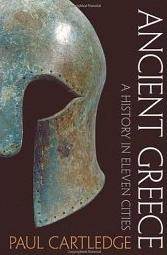 |
|
|
Review by John Trikeriotis of Paul Cartledge's Ancient Greece: A History in Eleven Cities |
|
| The civilization of ancient Greece had a unique political system in that a unified nation-state did not exist; instead, it was comprised of over 1,000 ‘poleis’, or cities/city-states, as they are more generally well known. This distinguishing feature owed itself somewhat to the vast expanse through which these entities were dispersed, not only on the Greek mainland, but also throughout the surrounding islands and beyond. Though these cities essentially shared the same religious beliefs, they were in most cases wholly autonomous and independent of each other, thereby maintaining an individuality which resulted in a separate and distinctive identity. Dr. Paul Cartledge has selected a handful of these ‘poleis’ in his book entitled “Ancient Greece: A History of Eleven Cities”. Presented in chronological order, these entities are classified within the following categories: Prehistory (Knossos and Mycenae); Dark and Archaic Age (Argos, Miletus, Massalia and Sparta); Classical Period (Athens, Syracuse and Thebes); The Hellenistic Age (Alexandria), and finally Retrospect and Prospect (Byzantion). Serving as an introduction to the rich history of Greek civilization, this title offers a profile of each of these diverse cities, separated by not only geography, but in most instances, centuries as well. |
|
As a historical consultant, author, lecturer and editor of countless volumes on ancient Greece, Professor Cartledge has established himself as one of the leading authorities on both Athens and Sparta, therefore, it comes as no surprise as to their inclusion in this title. What may intrigue readers are the criteria used in the selection process of the rest of these ‘poleis’, several of which might appear unconventional at first glance, such as Massalia (Marseilles) and Byzantion (Byzantium). However, the rationale for all the choices are justified in the context of not limiting the realm of Greek influence to only Aegean Greece. While Cartledge’s erudition is evident throughout this book, it is especially perceptible when he addresses the city-state of Thebes. As the largest ‘polis’ of the area known as Boeotia, Thebes’ Hellenism has been questioned and is by far the most convoluted of not only the cities represented in this book, but perhaps of ancient Greek civilization in its entirety. The reasons for this assessment are most apparent during the Greco-Persian Wars of 490-479 BC, which accorded Thebes the wrath of their fellow countrymen, and most pointedly those who fought with the Greek alliance against Persia. |
|
|
|
|
|
(Posting date 29 March 2011) HCS encourages readers to view other articles and releases in our permanent, extensive archives at the URL http://www.helleniccomserve.com/contents.html. |
|
|
|
|
2000 © Hellenic Communication Service, L.L.C. All Rights Reserved.
http://www.HellenicComServe.com |
|

